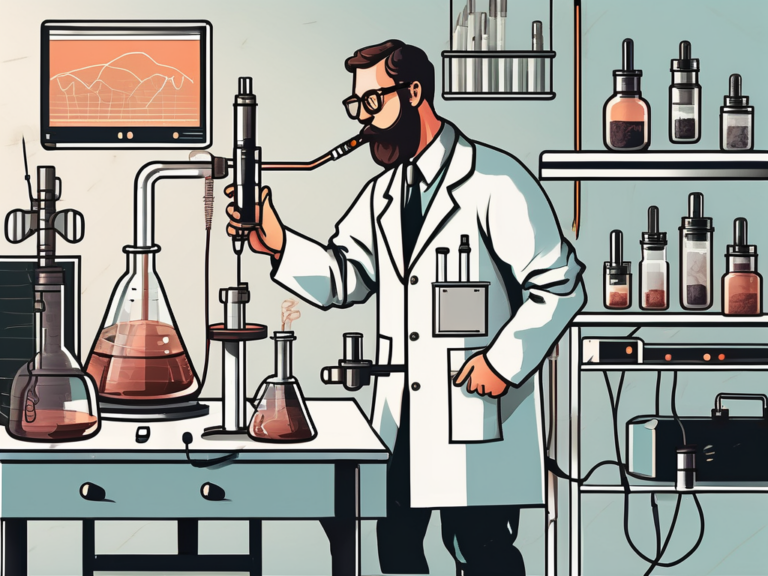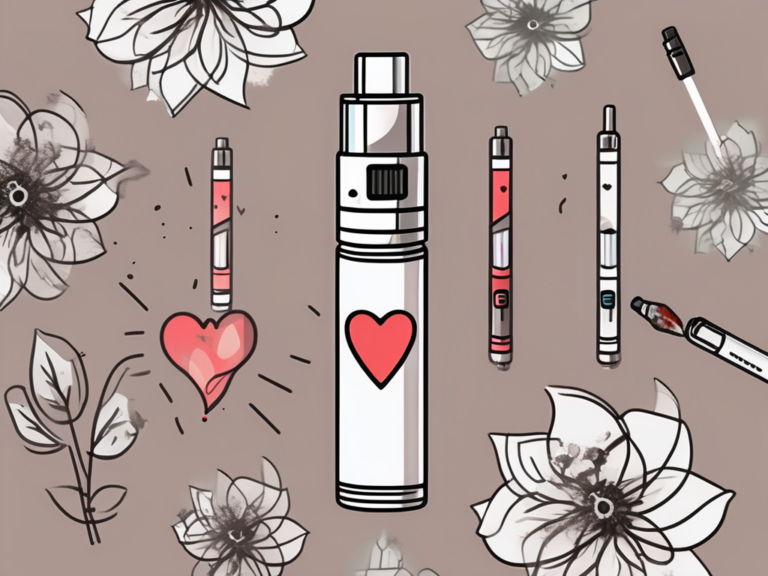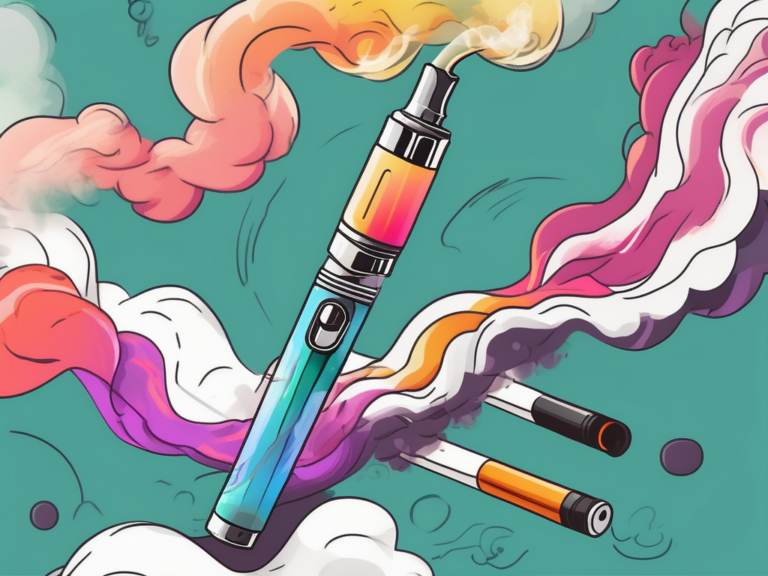can kissing someone who vapes affect you
As someone who is concerned about your health and well-being, you may have wondered if kissing someone who vapes can affect you. In this article, we will explore the components of vaping, the science behind it, the potential health risks associated with it, and whether or not kissing a vaper can have any implications for your health. We will also provide tips on how to protect yourself from vape exposure.
Understanding Vaping and Its Components
What is Vaping?
Vaping is the act of inhaling and exhaling aerosol produced by an electronic cigarette or similar device. Unlike traditional cigarettes, vaping does not involve combustion or burning of tobacco. Instead, it uses an electronic device that heats a liquid, known as e-liquid or vape juice, to create aerosol.
Vaping has gained popularity as an alternative to smoking, with many users finding it to be a less harmful option. The process of vaping allows users to satisfy their nicotine cravings without being exposed to the harmful chemicals found in tobacco smoke.
The Main Components of Vape
A typical vape device consists of a battery, an atomizer, and a tank or cartridge that holds the e-liquid. The battery provides power to the atomizer, which heats the e-liquid and turns it into aerosol. The e-liquid usually contains nicotine, flavorings, and other chemicals.
The atomizer is a crucial component of a vape device as it is responsible for heating the e-liquid to the point of vaporization. It often contains a coil that heats up when the battery is activated, causing the e-liquid to turn into the inhalable aerosol. The tank or cartridge holds the e-liquid and ensures a steady supply to the atomizer, allowing for a consistent vaping experience.
The Science Behind Vaping and Secondhand Exposure
How Vaping Works
When a vaper inhales from the device, the battery powers the atomizer to heat the e-liquid. This heat causes the e-liquid to vaporize, producing aerosol that is then inhaled into the lungs. The aerosol may contain nicotine, as well as other harmful chemicals.
Vaping devices come in various forms, from simple e-cigarettes to more complex mods and pods. These devices have different components such as batteries, atomizers, and tanks or pods to hold the e-liquid. The e-liquid itself is a mixture of propylene glycol, vegetable glycerin, flavorings, and sometimes nicotine. The heating element, usually a coil, vaporizes this liquid to create the inhalable aerosol.
The Concept of Secondhand Vapor
Secondhand vapor refers to the aerosol released into the air when a person exhales while vaping. While it is often less harmful than secondhand smoke from traditional cigarettes, secondhand vapor can still contain nicotine and potentially harmful chemicals. The extent of exposure and associated health risks can vary depending on factors such as the ventilation of the area and the length of exposure.
Research on secondhand vapor is still ongoing, with studies focusing on the effects of exposure to bystanders, especially in enclosed spaces. The composition of secondhand vapor can differ from firsthand vapor due to factors like dilution and chemical changes in the air. Understanding these nuances is crucial in assessing the overall impact of vaping on public health.
Potential Health Risks Associated with Vaping
Vaping, a popular alternative to traditional smoking, has raised concerns regarding potential health risks. While many individuals turn to vaping as a perceived safer option, it is essential to understand the possible consequences it may have on one’s health. In addition to the well-documented risks associated with traditional smoking, vaping introduces its own set of health concerns that users should be aware of.
Short-term Health Effects of Vaping
Short-term health effects of vaping may include irritation of the respiratory system, throat, and eyes. Some individuals may also experience coughing, headache, and nausea. These effects are typically mild and tend to resolve on their own. It is crucial for users to be mindful of these immediate reactions and seek medical attention if symptoms persist or worsen.
Long-term Health Effects of Vaping
The long-term health effects of vaping are still being studied, as e-cigarettes and vaping devices are relatively new to the market. However, research suggests that prolonged use of e-cigarettes may potentially lead to lung and cardiovascular problems. Chronic exposure to the chemicals present in e-liquids and aerosols may contribute to respiratory issues and impact overall cardiovascular health. It is important to note that the long-term effects of vaping are not yet fully understood, and further research is needed to comprehensively assess the potential risks associated with prolonged use.
Can Kissing a Vaper Affect You?
Direct Contact with Vape Particles
Kissing a vaper may lead to direct contact with vape particles present in their breath or on their lips. Vape particles are tiny liquid droplets that can contain various chemicals, including nicotine, flavorings, and other substances. When a person vapes, these particles are released into the air and can potentially settle on surfaces or be present in their exhaled breath. Therefore, when kissing a vaper, there is a possibility of coming into contact with these particles, although the actual health implications of this exposure are not yet fully understood.
It is important to note that the amount of vape particles transferred during a kiss is likely to be minimal, especially if the vaper takes precautions such as exhaling away from their partner before engaging in physical contact. Additionally, factors such as the type of vaping device used, the ingredients in the e-liquid, and the frequency of vaping can all play a role in the composition of the vape particles and their potential effects on others.
Possible Health Implications
Although limited research has been conducted on the specific health implications of kissing a vaper, it is believed that any potential risks would be relatively low. The primary concern would be the transfer of chemicals present in the aerosol, such as nicotine, which could potentially be absorbed through the skin or mucous membranes. However, the likelihood of significant harm from occasional exposure through kissing is considered to be minimal.
As with any personal habit or behavior that may have health implications, it is always advisable to engage in open communication about such matters within a relationship. By discussing concerns and preferences openly, individuals can make informed decisions together and establish boundaries that are comfortable for both parties involved. Ultimately, understanding the potential risks and taking proactive steps to minimize exposure can help mitigate any concerns related to kissing a vaper.
How to Protect Yourself from Vape Exposure
Vaping has become a prevalent habit in many societies, and it is essential to address concerns about vape exposure, especially in intimate relationships. For non-vapers, discussing your worries with your partner who vapes is a crucial step in protecting yourself. By openly communicating your preferences and expectations regarding their vaping habits, you can work together to find a balance that minimizes aerosol emissions in shared spaces and during close interactions.
Moreover, understanding the components of e-cigarettes and the potential health risks associated with vaping can empower non-vapers to make informed decisions about their exposure. Researching the latest studies on secondhand vape effects and discussing them with your partner can lead to a more comprehensive approach to safeguarding your well-being.
Tips for Non-Vapers
If you are a non-vaper and want to protect yourself from vape exposure, consider discussing your concerns with your partner who vapes. Openly communicate your preferences and expectations regarding their vaping habits, such as minimizing aerosol emissions and practicing good oral hygiene before intimate moments.
Furthermore, creating designated vape-free zones in your living space can help reduce overall exposure to aerosol particles. By establishing boundaries and mutual respect for each other’s health concerns, both partners can contribute to a safer and healthier environment.
Advice for Vapers
If you are a vaper, it is essential to be considerate of your partner’s worries and take proactive steps to address them. Apart from minimizing exhaled aerosols, exploring alternative vaping techniques like using lower emission devices or vaping outdoors can further mitigate potential exposure risks.
In addition to external measures, focusing on personal oral hygiene as a vaper is crucial for reducing the transmission of harmful chemicals to your partner. Regularly brushing your teeth, using mouthwash, and staying hydrated not only promote good oral health but also help in minimizing the residual effects of vaping on your breath and overall well-being.
Conclusion
In conclusion, while kissing a vaper may involve direct contact with vape particles, the health risks associated with this contact are not yet fully understood. It is advisable for both non-vapers and vapers to have open communication about preferences and concerns within a relationship. If you have any specific health concerns, it is always best to consult with a healthcare professional for personalized advice.






